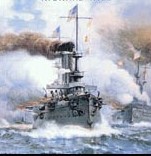Britain in 1914
At the beginning of
the 20th century the British
Empire covered more than 11,400,000 square miles of territory.
This made it the largest empire the world had ever known. The
foundations for the empire were laid between 1750 and 1850 during
which Britain acquired
- India,
- Australia,
- Canada,
- New Zealand,
- South Africa,
- Rhodesia,
- Hong Kong,
- Gibraltar,
- several islands in the West Indies
- and various colonies on the African coast.
The late 19th
century saw the acquisition of new territories in Africa and by 1900
the British king, Edward
VII, reigned over 410 million
people.
The British
Empire was protected by a Royal Navy
that included 
- 18 modern dreadnoughts,
- 29 battleships (pre-dreadnought design),
- 10 battlecruisers,
- 20 town cruisers,
- 15 scout cruisers,
- 200 destroyers
- and 150 cruisers.
By 1914 Britain was no longer the dominant economic power in
Europe. It still had the world's largest shipbuilding industry but in
other areas such as coal, iron, chemicals and light engineering,
Britain was out-performed by Germany.
In 1914 Britain was a constitutional monarchy under George
V. The government was formed by the
majority party of the House of
Commons. Members of this parliament were elected by some 8 million
registered male voters.
The aristocratic House of
Lords had limited power to veto legislation.
The Liberal
Party had governed Britain since 1906. Senior members of the
government included Herbert
Asquith (Prime Minister), Sir Edward
Grey (Foreign Secretary) and David Lloyd
George (Chancellor of the Exchequer). Ramsay
MacDonald (Labour
Party) and Andrew Bonar Law (Conservative
Party) led the main opposition parties in the House of
Commons.
Since the later part of the 19th century the
British government had considered Germany
to be the main threat to its empire. This was reinforced by Germany's decision in 1882 to form the Triple
Alliance. Under the terms of this military alliance, Germany,
Austria-Hungary
and Italy
agreed to support each other if attacked by either France
or Russia.
France felt
threatened by the Triple
Alliance. Britain was also concerned by the growth in the German
Navy and in 1904 the two countries signed the
